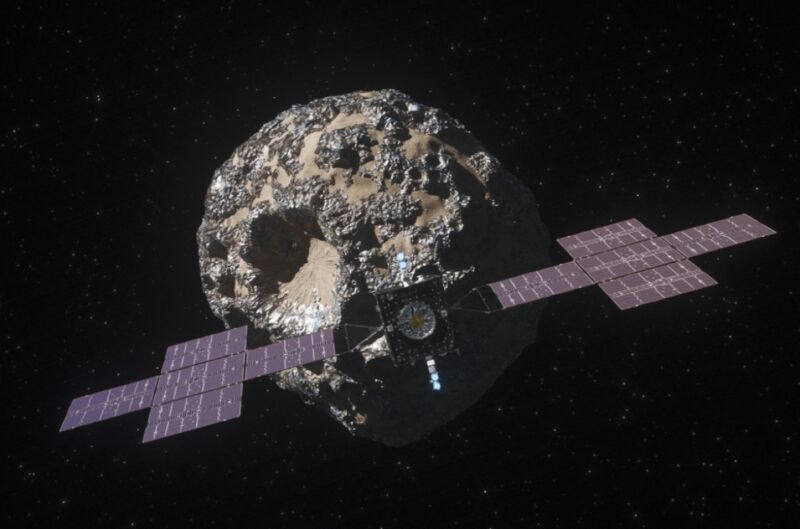
One year after NASA announced an indefinite delay of a much-anticipated mission to visit a metal-rich asteroid, the agency said Monday that the Psyche spacecraft is back on track. The Psyche mission is now scheduled to launch in four months on a Falcon Heavy rocket, and everyone involved in the project feels good about that date.
"We believe Psyche is on a positive course for an October 2023 launch," said Thomas Young, who chaired an independent review board that NASA convened last summer after the mission was delayed.
If the mission does launch this fall, the spacecraft will reach asteroid Psyche in August 2029. There, it will go into orbit for 26 months to gain insights into planetary formation, understand the interior of terrestrial planets like Earth, and examine a world that is made largely of metal. The mission is also of interest to the nascent asteroid mining community, which seeks to learn about the potential value harbored by these relatively rare, metallic asteroids.
A lot of problems
Last year, Young and the rest of the board members found a litany of problems with the mission, including serious issues with the flight software and an incomplete process to verify that software and the vehicle's systems.
In a report published last November, the review board laid much of the blame on management at NASA's Jet Propulsion Laboratory in California, which oversaw Psyche's development and testing. The field center, which leads many of the space agency's most prestigious science missions, had undertaken an "unprecedented workload" without possessing the resources needed to complete major projects.
These issues were exacerbated by the COVID-19 pandemic, which came at a key time in the final phase of the Psyche mission's development and hampered hiring and in-person activities needed to complete testing of the spacecraft.
After that review, NASA and the Jet Propulsion Laboratory worked to respond to the recommendations by the review board to address these issues. For example, the Psyche program added experienced team members, reorganized a large part of its workforce, and used better metrics to monitor progress toward launch and operational readiness.
Recently, the review board reconvened to consider this response by NASA, and according to Young, its members were "extraordinarily impressed" by the actions taken. Monday's teleconference with reporters was to share this feedback publicly and express confidence in the looming launch date.
Staffing up
Laurie Leshin became the director of the Jet Propulsion Laboratory just weeks before the Psyche mission was put on hold last year. On Monday, she said she welcomed the independent review of Psyche's problems and the larger issues at the California-based field center so that they could be addressed by her leadership team.
Since then, Leshin said, NASA has been aggressive about hiring from the tech industry—which has undergone significant layoffs—and recruiting back employees who were lost to private space companies in the Los Angeles area. In some ways, she said, NASA is the victim of its own success as it has sought to foster the US commercial space industry.
"There is more competition with the commercial space sector because there is a much more significant commercial space sector," Leshin said. "As hard as that is for us, it's really gratifying to see that the investments that we are making, and the partnerships that we are building to help advance the commercial space sector, are really working."
There was a lot of happy talk on the call Monday from Leshin and other NASA officials, including Nicola Fox, the associate administrator for the agency's Science Mission Directorate. However, Fox declined to say how much the one-year delay added to the cost of the mission, which was recently pegged at $1.13 billion by the US Government Accountability Office.
Also, NASA has yet to demonstrate that these staffing and management problems at the Jet Propulsion Laboratory are truly behind it. The proof will come with getting Psyche successfully into space, launching the ambitious Europa Clipper mission next year, and restarting work on the recently paused VERITAS mission to Venus.
reader comments
98